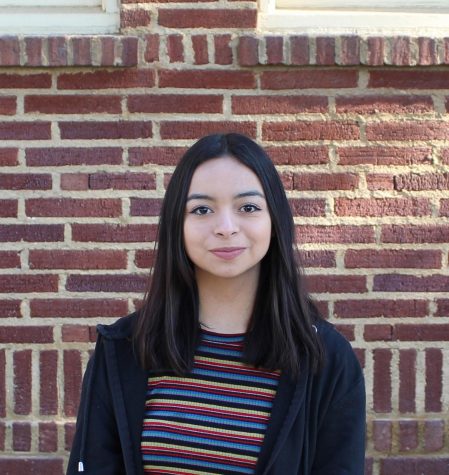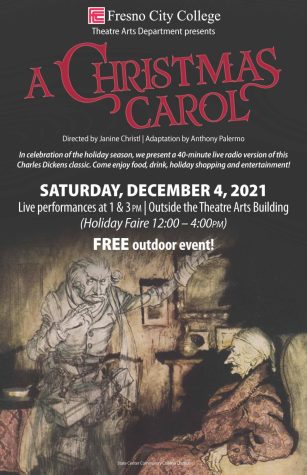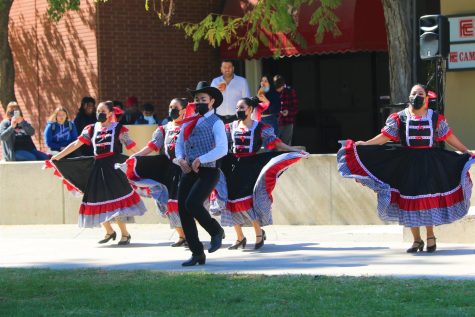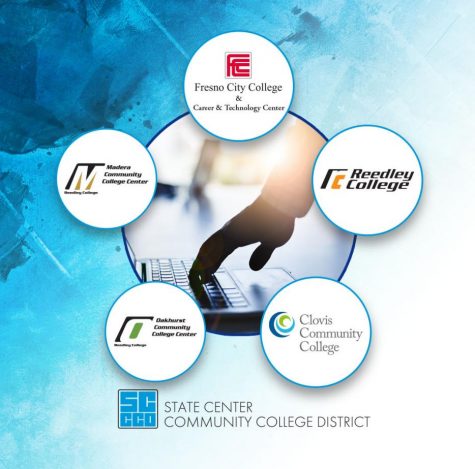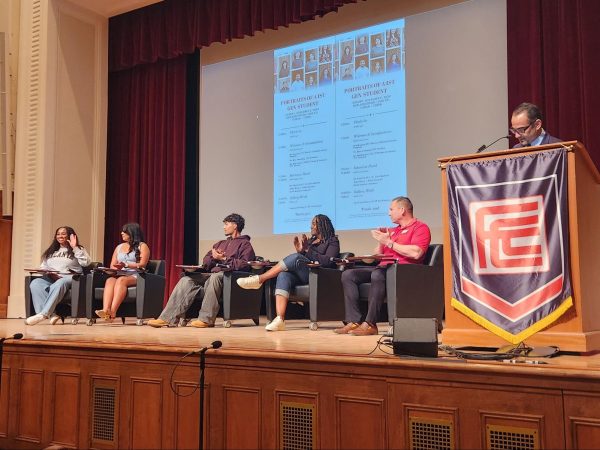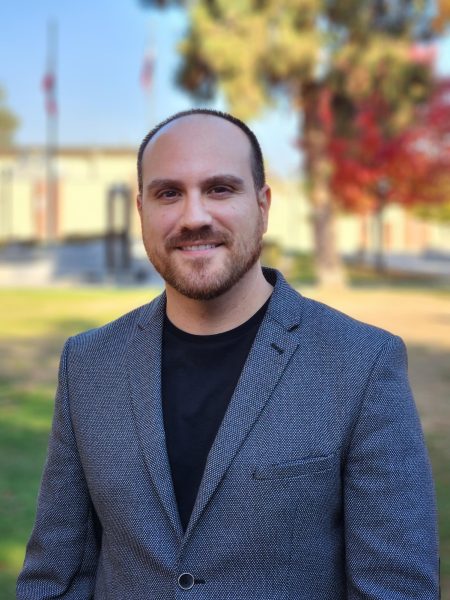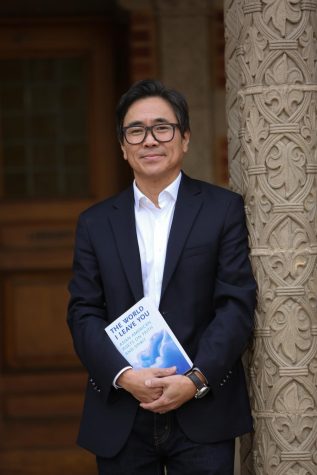ASFA Proposes Gym Curtains and Bathroom Accessibility
Our in-depth report on all-gender and non-binary gender accommodation on campus
Fresno City College has taken several steps to provide access and accommodations for all students and has 23 all-gender restrooms on campus, even though 17 of them are locked for use by certain employees, according to Arien Reed, president of the Allied Staff and Faculty Association (ASFA).
There are currently six accessible all-gender restrooms in five different buildings on campus — Building A, the Speech/Music building, T-100, the child development center as well as two in the cafeteria. 12.5% of the 40 buildings identified on campus contain accessible “all gender” restrooms, according to Reed.
In comparing the number of all-gender restrooms at FCC to other colleges, Reed found that Fresno State has 21 “all-gender” restrooms around its campus while MiraCosta College has 18 all-gender restrooms across 48 buildings.
ASFA, a support network for staff, faculty, students and allies, is also proposing gym curtains for the locker rooms and more openly accessible gender neutral restrooms on campus. The association promotes academic success and higher retention rates of LGBTQ students as well as professional development for staff and faculty.
The organization also strives to address issues of school climate and culture for the LGBTQ community on campus and advises the office of the president on important matters.
In Reed’s proposal, he states that over a year ago, Shannon Robertson, the director of construction services for the State Center Community College District, promised to bring gender neutral restrooms to campus. Reed said Robertson kindly and quickly provided a list of alleged gender neutral restrooms, a starting point for Reed’s proposals.
Non-binary and transgender students as well as staff have had to cross from one end to the other on the FCC campus in search of a safe and accessible restroom.
In his proposal, Reed stated he has had first hand experience. He is a gay, transgender staff member, and has had to leave meetings or events for long periods of time, in order to find an unlocked all-gender restroom on campus.
“If, for instance, they do not have the time to walk from the Health Sciences to the Child Development Center or T-100 and back,” Reed said, “they must either face the risk of harassment (and thus shame and humiliation) or they must refrain from using a toilet at all and ‘hold it’ until they leave the campus for a location containing a safe and accessible toilet.”
According to Reed, every year, 8% of trans individuals develop urinary tract infections or kidney infections due to avoiding public restrooms for fear of being harassed.
He also explained that at least one-third of transgender individuals avoid eating/drinking throughout the day to avoid using the restroom in the first place.
FCC alumni and LGBTQ students identified that lack of safety and inclusive restrooms on campus contributed to unsuccessful completion of transfer-level Math and English courses.
There were experiences of harassment in the binary-gendered restrooms, as well as the general hostility on campus towards transgender and non-binary students.
“I was worried about who would see me walking into the men’s restroom,” said freshman Victor Lee, a transgender student majoring in studio arts. “I wasn’t ready to identify with who I actually am.”
“All the eyes you get while using a restroom specifically for the opposite sex can be awkward and discomforting,” Lee said.
In the last few years, staff, faculty, and students have claimed to raise these issues with the district.
“If I’m honest, a concern is that maybe those against it might use the restrooms to target those using it, hurting them physically and emotionally,” said Zyeke Mireles, a freshman and trans student. “But I and others simply have to have faith that everyone will be safe.”
According to the National Center for Transgender Equality, 12% of transgender people were verbally harassed in a public restroom, 1% physically attacked, 1% sexually assaulted, and 9% were denied the use of a public restroom.
“Gym changing/showering spaces are also a place where trans persons like myself are especially susceptible to harassment,” said Reed. “Which makes it difficult to utilize the space in which to exercise, making it difficult to alleviate the stress and depression far too many of us experience on a daily basis as a result of prejudicial treatment within a largely ignorant, transphobic, and homophobic society.”
Reed said he believes it would take many years before the campus is 100% inclusive in its facility design for financial reasons. His proposals suggest that in order to help make these facilities 50% inclusive without taking too long of a renovation, many selected restrooms would only need to change the locks and signage on the restroom doors. The cost of these specific changes would come out to $272.14.
Reed said he was approached via email on Aug. 6 by a faculty member who expressed concern for a transgender student who would be using the gym in the Fall 2019 semester. Reed was asked if there were any gender-neutral showering/changing/locker area for the student to use, or a policy that would allow the student to have privacy within areas of the gym.
The same morning, Reed reached out to Pamm Zierfuss-Hubbard, director of athletics and requested a tour of the gym facilities and a discussion about transgender and non-binary students’ access to areas.
Upon the tour, Reed noticed the lack of privacy in the gym changing/shower areas and was reassured that if any student ever felt uncomfortable or threatened at any moment while utilizing the gym locker room, they could let an employee in the area know first who might be able to assist, and to proceed through proper campus channels.
According to Reed, students with disabilities, students who identify within non-heterosexual orientations, and students who possess or otherwise express (via their clothes, behavior, sound of their voice, etc), a non-traditional gender identity often experience discomfort when changing and showering around heterosexual and cisgender students.
“It is important to note that the reverse is true for the non-LGBTQ students, though concerns for physical safety is not a common theme for non-LGBTQ students in similar settings,” said Reed.
“Privacy in these areas would mean these students can change and shower without fear of stares, remarks, other expressions of judgment, or instances of harassment,”
According to Reed, these proposals have been very time consuming. The audit itself took several weeks to complete. Writing the report took two months and Reed has had to meet with key personnel, draft emails and summaries about the proposals to the administrators.
He prepared a PowerPoint and presented these proposals on Oct. 17 to the ASG and Academic Senate for voting purposes. Classified Senate has also played a supportive role in these proposals and gave their “whole-hearted support right away, voicing only their unwavering support for our students,” Reed said.
The Allied Staff and Faculty Association plans to make presentations to the Management Council and the President’s Advisory Board and may also be presenting to the Facilities/EHS committee.
Reed said, “My proposals are very important for the well-being, and vocational and academic success of our LGBTQ and disabled employees and students.”

